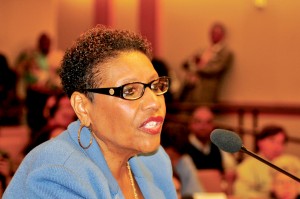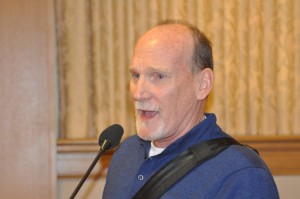Under Hannigan’s Leadership City “Gives Back” $600,000
Mar 14, 2013
By Ken A. Epstein
Some representatives of nonprofits agencies and community leaders are calling for a sweeping discussion and overhaul of the way the city runs the Workforce Investment Board (WIB) and its delivery of federal jobs funds to groups that help the unemployed, especially Oakland teenagers.
The City Council should authorize “an independent administrative and fiscal audit of the WIB finds,”which should be conducted by an

outside agency such as the state Employment Development Department or federal Department of Labor, said La Tronda Lumpkins, speaking at Tuesday afternoon’s meeting of the City Council’s Community and Economic Development (CED) Committee.
Lumpkins is executive director of Pivotal Point Youth Center in West Oakland.
“(Further), I ask for the system administration of the WIB dollars to be placed out for public bid because we need this system to be managed more efficiently by an organization with adequate workforce development experience,” she said.
“WIB’s attention has been on publically scrutinizing and humiliating its service providers. No attention has been put forth making adequate recommendations for work on a better workforce system.”
She focused on what she called an effort by the WIB “not to serve younger youth, ages 14 to 16, because performance outcomes would be much more difficult to obtain. This is not the best decision for Oakland,” she said.
The discussion at the CED meeting was on the agenda as a report by Executive Director John Bailey about why $600,000 in job money, which would have employed 40 laid-off workers, had to be returned unspent to the federal government in late 2012.
But speakers talked about many WIB issues, including late payments and contracts to agencies providing youth jobs, whether the city had gotten to the bottom of why the money was sent back and whether the WIB was in fact improving in response to criticisms.
Agreeing with speakers who demanded a full public hearing, Councilmember Larry Reid said he would call a hearing in the evening, so young people, agencies and members of the public could discuss and seek solutions to the issues that were being raised. He said the failure to call a public hearing so far was the result of miscommunication between himself and city staff.
Bailey, in his report, talked about the reason for the loss of the job money and the lessons that had been learned and incorporated by the WIB. He said the Dellums administration had won the grant, though as written, the funding contained “discrepancies” that made it impossible to implement without modifications.
“These discrepancies did not receive the full attention of the WIB until the addition of needed staff,” he said, and by then it was too late to spend most of the money.
As a result, he said, the city was only to provide jobs for 16 of the 56 workers who were supposed to receive help.
Further, Bailey said “Timely contracts…. and a quick reimbursement process to providers… (are) something I personally monitor today. If there’s an issue that might delay payment, staff knows to notify me right away.”
Mike Hannigan, WIB board member and former chairman of the WIB board, said the loss of money was due to a unique set of circumstances that were not likely to be repeated.
“I was the chair at the time,” he said. “ It happened on my watch.”

“It’s very easy from the outside to come in and complain how everything didn’t come out perfectly, but when you are in a position of having to actually produce results under rules that are established for you and guidelines that you have to implement, sometimes it looks a little bit different,” said Hannigan, who is president and co-founder at Give Something Back Business Products.
Gloria Crowell, development director at Allen Temple Baptist Church, which has youth and adult job programs, said she had tried to seek funding through the WIB but found the process hard to navigate.
“I am disillusioned by the inability for the WIB board to get this thing correctly, to get the service dollars that should be out in the streets to the youth who really need these dollars. We are losing, and our youth are losing,” she said.
Ben Tapscott, retired McClymonds High School coach and West Oakland education activist, said the city’s WIB staff should not continue administering job programs.
“I’ll talk in coachs’ terms here: I watched them fumble, drop the ball, make fouls. They are in my opinion not doing what they are supposed to do,” said Coach Tapscott.
The loss of $600,000 “ is only the tip of the iceberg,” he said. “Half of our children are out on the streets with nothing to do. “
Dezie Woods-Jones, chair of the Oakland Private Industry Council board and former City Council member, said she was pleased the city and the WIB were seeking answers and solutions.
“I am pleased to hear the WIB director speak about understanding lessons learned,” she said,” But we don’t want (the loss) to have to be repeated.”
Rashidah Grinage, executive director of PUEBLO, which provides jobs for youth, said she is not convinced the WIB has turned the corner.
“While its well to understand and learn lessons, we haven’t heard at WIB meetings very much that inspires confidence that the future will be different and that the future will be better,” she said.
Also speaking was Gretchen White, president of the Metropolitan Greater Oakland (MGO) Democratic Club, who called for accountability of staff members responsible for losing the $600,000 grant.